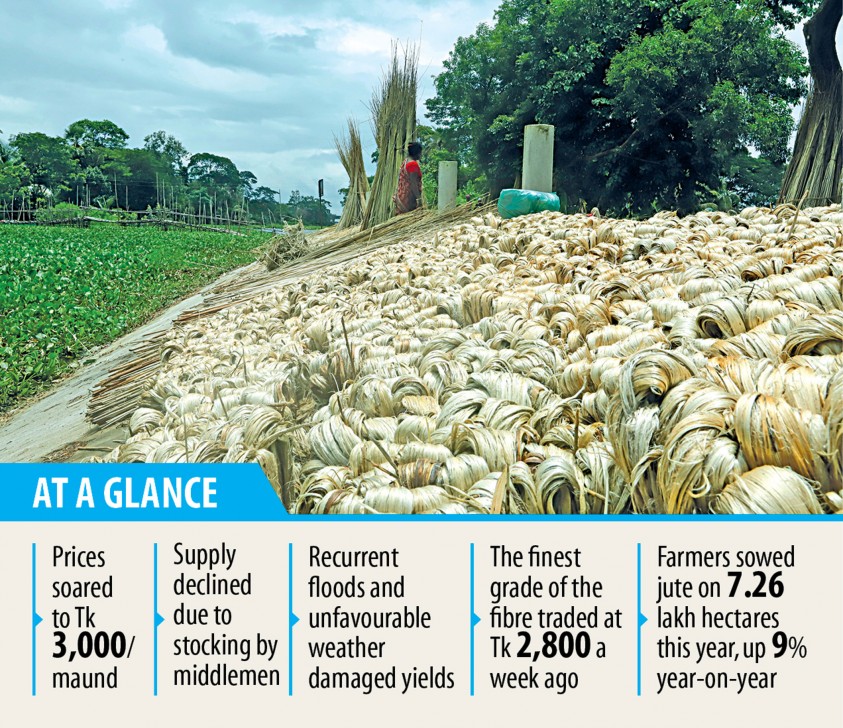Raw jute prices soar to record high

Raw jute prices hit a record most of around Tk 3,000 per maund as supply declined in the markets of producing regions owing to stocking by middlemen and slow release by farmers wanting to profit from flood-induced production fall, various traders said yesterday.
The finest grade of the natural fibre, utilized by local mills to create yarn mainly for export, traded at Tk 2,800 per maund a week ago.
Since then, prices have shot up to Tk 3,000 per maund as availability fell in the markets, said Prabir Saha, a jute trader at Madhukhali of Faridpur, one of the primary jute producing districts.
"These are the highest prices I have ever seen. Farmers are profiting from the spiralling prices. A portion of middlemen, particularly those who do stocking business seasonally, are also profiting from the high prices," he said over the telephone yesterday.
Prices of jute started increasing since the beginning of harvest early last month as recurrent floods and unfavourable weather damaged yields.
The Department of Agricultural Extension (DAE) estimates that the total cultivation area this season has increased by 9 % to 7.26 lakh hectares from that in the last season.
After losses, total jute acreage stood at 7 lakh hectares this year and farmers bagged 72.86 lakh bales.
Yet jute millers feel that overall yield will be much lower.
Taking into account flood related crop losses and untimely sowing, overall production will be 55 lakh bales this season, said spinners and millers.
The annual dependence on raw jute is 65 lakh bales, of which 60 lakh bales is consumed by mills to create yarn, sacks, bags and twine.
The rest is utilized by households, said the Bangladesh Jute Spinners Association (BJSA) and Bangladesh Jute Mills Association (BJMA).
Earlier this week, millers in a joint letter to the prime minister cited the problem of shortfall from requirement and raised concerns over the increasing prices of raw jute.
"Current prices of raw jute are in Tk 2,900-Tk 3,000 per maund. Prices are increasing weekly. This is never seen before," read the letter.
It urged for imposing export duty of $250 per tonne to discourage the export of raw jute and increasing availability in the local market.
Millers said the deficit amount in the domestic requirement had widened due to exports.
The latest data on the amount of raw jute export isn't available however the Export Promotion Bureau showed that raw jute exporters earned 38 % higher year-on-year to $20 million in the July-August amount of the existing fiscal year from that a year ago.
Abdul Quayyum, secretary general of the Bangladesh Jute Association (BJA), said more than 100,000 bales of raw jute could possibly be exported in the July-September period this season.
The BJA earlier opposed the millers and urged the federal government not to impose any duty on raw jute exports, saying that the requirement of the fibre reduced this season as a result of closure of 25 state-run jute mills from July.
"Farmers will feel encouraged to produce more if high prices persist," said Quayyum.
Jute millers, however, said prices of raw jute should be kept steady to avoid the closure of mills, which employ practically two lakh workers.
In the letter to the prime minister, millers said farmers will be deprived of prices if mills were to turn off for a shortage of raw materials resulting from higher prices.
"It has come to notice that stockists have placed raw jute to create high profit. If the trend continues, many mills may turn off," said the letter signed by BJSA and BJMA chairmen Md Zahid Miah and Mohammed Mahbubur Rahman Patwari.
Both associations urged the federal government to stop traders without licences from taking part in raw jute trading.
In addition they demanded that the government make sure that authorised jute traders and stockists usually do not hold a lot more than 1,000 maunds of raw jute for over a month.
Md Shahid Hossain Dulal, owner of Progress International, an exporter and supplier of raw jute to mills, said the majority of the raw jute were now beneath the possession of middlemen.
"This is a huge crisis in the jute market. Prices of all categories of jute have risen to extremely high levels. Jute will there be and one can get it if he pays the purchase price sought by traders," he said.
Contacted over the phone, Textiles and Jute Secretary Lokman Hossain Miah didn't want to touch upon the soaring prices and opposing stance of raw jute exporters and millers.
